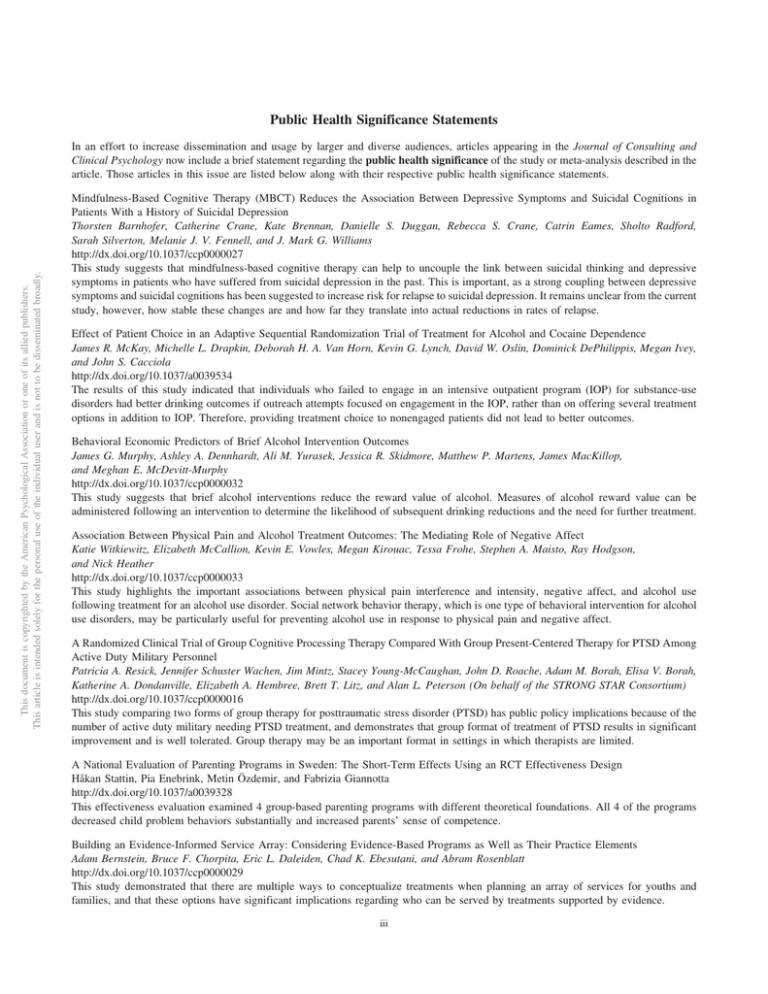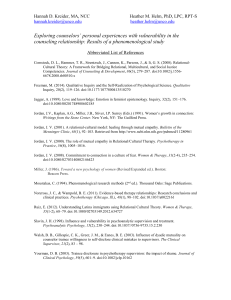Number 6 (December) - American Psychological Association
advertisement

Public Health Significance Statements This document is copyrighted by the American Psychological Association or one of its allied publishers. This article is intended solely for the personal use of the individual user and is not to be disseminated broadly. In an effort to increase dissemination and usage by larger and diverse audiences, articles appearing in the Journal of Consulting and Clinical Psychology now include a brief statement regarding the public health significance of the study or meta-analysis described in the article. Those articles in this issue are listed below along with their respective public health significance statements. Mindfulness-Based Cognitive Therapy (MBCT) Reduces the Association Between Depressive Symptoms and Suicidal Cognitions in Patients With a History of Suicidal Depression Thorsten Barnhofer, Catherine Crane, Kate Brennan, Danielle S. Duggan, Rebecca S. Crane, Catrin Eames, Sholto Radford, Sarah Silverton, Melanie J. V. Fennell, and J. Mark G. Williams http://dx.doi.org/10.1037/ccp0000027 This study suggests that mindfulness-based cognitive therapy can help to uncouple the link between suicidal thinking and depressive symptoms in patients who have suffered from suicidal depression in the past. This is important, as a strong coupling between depressive symptoms and suicidal cognitions has been suggested to increase risk for relapse to suicidal depression. It remains unclear from the current study, however, how stable these changes are and how far they translate into actual reductions in rates of relapse. Effect of Patient Choice in an Adaptive Sequential Randomization Trial of Treatment for Alcohol and Cocaine Dependence James R. McKay, Michelle L. Drapkin, Deborah H. A. Van Horn, Kevin G. Lynch, David W. Oslin, Dominick DePhilippis, Megan Ivey, and John S. Cacciola http://dx.doi.org/10.1037/a0039534 The results of this study indicated that individuals who failed to engage in an intensive outpatient program (IOP) for substance-use disorders had better drinking outcomes if outreach attempts focused on engagement in the IOP, rather than on offering several treatment options in addition to IOP. Therefore, providing treatment choice to nonengaged patients did not lead to better outcomes. Behavioral Economic Predictors of Brief Alcohol Intervention Outcomes James G. Murphy, Ashley A. Dennhardt, Ali M. Yurasek, Jessica R. Skidmore, Matthew P. Martens, James MacKillop, and Meghan E. McDevitt-Murphy http://dx.doi.org/10.1037/ccp0000032 This study suggests that brief alcohol interventions reduce the reward value of alcohol. Measures of alcohol reward value can be administered following an intervention to determine the likelihood of subsequent drinking reductions and the need for further treatment. Association Between Physical Pain and Alcohol Treatment Outcomes: The Mediating Role of Negative Affect Katie Witkiewitz, Elizabeth McCallion, Kevin E. Vowles, Megan Kirouac, Tessa Frohe, Stephen A. Maisto, Ray Hodgson, and Nick Heather http://dx.doi.org/10.1037/ccp0000033 This study highlights the important associations between physical pain interference and intensity, negative affect, and alcohol use following treatment for an alcohol use disorder. Social network behavior therapy, which is one type of behavioral intervention for alcohol use disorders, may be particularly useful for preventing alcohol use in response to physical pain and negative affect. A Randomized Clinical Trial of Group Cognitive Processing Therapy Compared With Group Present-Centered Therapy for PTSD Among Active Duty Military Personnel Patricia A. Resick, Jennifer Schuster Wachen, Jim Mintz, Stacey Young-McCaughan, John D. Roache, Adam M. Borah, Elisa V. Borah, Katherine A. Dondanville, Elizabeth A. Hembree, Brett T. Litz, and Alan L. Peterson (On behalf of the STRONG STAR Consortium) http://dx.doi.org/10.1037/ccp0000016 This study comparing two forms of group therapy for posttraumatic stress disorder (PTSD) has public policy implications because of the number of active duty military needing PTSD treatment, and demonstrates that group format of treatment of PTSD results in significant improvement and is well tolerated. Group therapy may be an important format in settings in which therapists are limited. A National Evaluation of Parenting Programs in Sweden: The Short-Term Effects Using an RCT Effectiveness Design Håkan Stattin, Pia Enebrink, Metin Özdemir, and Fabrizia Giannotta http://dx.doi.org/10.1037/a0039328 This effectiveness evaluation examined 4 group-based parenting programs with different theoretical foundations. All 4 of the programs decreased child problem behaviors substantially and increased parents’ sense of competence. Building an Evidence-Informed Service Array: Considering Evidence-Based Programs as Well as Their Practice Elements Adam Bernstein, Bruce F. Chorpita, Eric L. Daleiden, Chad K. Ebesutani, and Abram Rosenblatt http://dx.doi.org/10.1037/ccp0000029 This study demonstrated that there are multiple ways to conceptualize treatments when planning an array of services for youths and families, and that these options have significant implications regarding who can be served by treatments supported by evidence. iii iv This document is copyrighted by the American Psychological Association or one of its allied publishers. This article is intended solely for the personal use of the individual user and is not to be disseminated broadly. The Relationship Between Session Frequency and Psychotherapy Outcome in a Naturalistic Setting David M. Erekson, Michael J. Lambert, and Dennis L. Eggett http://dx.doi.org/10.1037/a0039774 As mental health and the efficiency of mental health treatment have become prominent areas of concern in the broader health care milieu, research on practical constructs that affect clinically significant change have become more important. The current study offers evidence that higher session frequency increases the efficiency of psychotherapy in clinically significant ways, decreasing length of patient suffering and possibly requiring fewer institutional resources. Meta-Analysis of Dropout From Cognitive Behavioral Therapy: Magnitude, Timing, and Moderators Ephrem Fernandez, Dara Salem, Joshua K. Swift, and Nirvana Ramtahal http://dx.doi.org/10.1037/ccp0000044 This meta-analysis discovered that dropout from cognitive behavioral therapy (CBT) occurs even before treatment starts, rising to an even higher level during treatment, total attrition rate across both phases reaching about 35%. Ironically, other factors being constant, the longer the planned course of CBT, the less likely a treatment starter will drop out. Dropout risk is significantly higher in depressed clients, outpatient settings, and e-therapy. Findings suggest a need for preparatory strategies and careful selection and supplementation of treatment setting/delivery according to the diagnosis in question. Effects of Aerobic Training, Resistance Training, or Both on Psychological Health in Adolescents with Obesity: The HEARTY Randomized Controlled Trial Gary S. Goldfield, Glen P. Kenny, Angela S. Alberga, Denis Prud’homme, Stasia Hadjiyannakis, Réjeanne Gougeon, Penny Phillips, Heather Tulloch, Janine Malcolm, Steve Doucette, George A. Wells, Jinhui Ma, Jameason D. Cameron, and Ronald J. Sigal http://dx.doi.org/10.1037/ccp0000038 The findings suggest that 6 months of resistance training at a frequency of 324 sessions per week, either alone or in combination with aerobic training, may improve psychological health in adolescents with obesity. This trial demonstrated that resistance training may provide psychological benefits among adolescents with obesity, and therefore may represent a potential exercise alternative for youth who find aerobic training uncomfortable or unenjoyable. Involving Clients in Treatment Methods: A Neglected Interaction in the Therapeutic Relationship Viktor Kaldo, Jonas Ramnerö, and Susanna Jernelöv http://dx.doi.org/10.1037/ccp0000039 This study confirms the importance of adding therapist support to self-help material designed for a specific condition. The main finding is that the extra benefit of therapist support is mediated by increased client involvement in key treatment methods, rather than other aspects of the therapeutic relation. This underscores that support should focus on encouragement, monitoring, and feedback in relation to these methods. A Family-Based Intervention for Improving Children’s Emotional Problems Through Effects on Maternal Depressive Symptoms Julia D. Reuben, Daniel S. Shaw, Lauretta M. Brennan, Thomas J. Dishion, and Melvin N. Wilson http://dx.doi.org/10.1037/ccp0000049 This study suggests that a brief, home-based, preventive intervention such as the Family Check-Up can have meaningful long-term effects on children’s emerging emotional problems. Although initially designed to improve children’s conduct problems by improving parenting practices, in the current study, the Family Check-Up contributed to both improvements in maternal depressive symptoms during the toddler years and subsequent reductions in school-age emotional problems. Interest in Spiritually Integrated Psychotherapy Among Acute Psychiatric Patients David H. Rosmarin, Brent P. Forester, Daniel M. Shassian, Christian A. Webb, and Thröstur Björgvinsson http://dx.doi.org/10.1037/ccp0000046 This study suggests that many patients desire spiritually integrated psychotherapy. Furthermore, many religiously affiliated patients report low interest, and conversely many unaffiliated patients report high interest. Differential Effects of Prolonged Exposure on Posttraumatic Stress Disorder Symptoms in Female Veterans Paula P. Schnurr and Carole A. Lunney http://dx.doi.org/10.1037/ccp0000031 Prolonged Exposure is an effective treatment for posttraumatic stress disorder. However, this study suggests that Prolonged Exposure may be especially helpful for individuals who struggle with avoidance and numbing. Changes in Posttraumatic Cognitions Predict Changes in Posttraumatic Stress Disorder Symptoms During Cognitive Processing Therapy Jeremiah A. Schumm, Benjamin D. Dickstein, Kristen H. Walter, Gina P. Owens, and Kathleen M. Chard http://dx.doi.org/10.1037/ccp0000040 This study shows that by changing trauma-related thoughts, cognitive processing therapy effectively alleviates posttraumatic stress disorder (PTSD), which is a major public health burden. Based on these results, psychotherapies for PTSD may be effective to the extent that these interventions can alter individuals’ perceptions of self-blame and other trauma-related negative beliefs.

